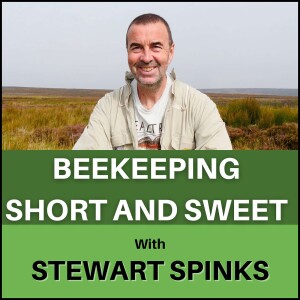
Hi I’m Stewart Spinks and welcome to episode 57 of my podcast, Beekeeping Short and Sweet. I’ve been inspecting this week carrying out first Spring checks on some my colonies and it got me thinking about how I use a smoker, so here are my thoughts.
Websites mentioned in today's podcast:
My Website: http://www.norfolk-honey.co.uk
My additional videos and up to date podcasts Page: Norfolk Honey Co at Patreon
The smokers I currently use available from Bee-Equipment online
Welcome once again to my weekly podcast, If you want to catch up with the very latest podcast do check out my Patreon page where you can get up to date with all of my content as we head into the new season.
The last couple of days have been lovely, Spring days, each day has that characteristically chilly start but as the sun burns through the clouds so the day warms up and around lunchtime I’m talking T shirt weather and that’s just fine for checking the bees. To be specific I’m looking at something like 14 degrees, it’s on the edge for beginner beekeepers, but most experienced beekeepers who can inspect relatively quickly can get into a hive see what they need to see and get out without too much disruption.
Also, and I know I’m repeating myself here but know exactly why you’re checking your colonies. Have a check list in your head or even write it down if you need a reminder.
Size of colony, Large or small?, Food, Do they have enough? Brood, Is there a nice brood pattern forming, Eggs, Can you see eggs in any of the cells? Drones, are there any drones or drone cells? Queen cells, Unlikely in early March but keep an eye open, it’s been warm! Queen, but only if she’s spotted, don’t waste time searching for her.
That’s probably all you need on your list to start with, you can see most if not all of these things as you move through the frames with bees on, quickly and quietly, causing the minimum amount of fuss as you go. Finish off by moving all the frames back in place and close the hive down again.
Remember to write up your inspection notes and grab cuppa while you think back to what you’ve seen and plan out the next steps.
Of course, you’ll already have checked over your notes prior to inspecting the colony so most of what you see shouldn’t be a huge surprise for the most part.
I’ve already picked out just three colonies that I intend to select as my queen rearing colonies. You have to be ruthless when selecting to raise queens, even if you have just three or four colonies, more often than not, one will stick out as a favourite or something about them will set them apart from the rest. It may be that they are super calm, or perhaps they produced more honey than the rest of your colonies put together last year. Whatever it is, if you just have a few colonies try to be very selective about the one you choose to raise new queens from. It will pay dividends in the end.
I have inspected a few hives this week, and for the most part all of them are doing fine, the warm Winter has allowed colonies to begin building up strongly and some colonies are filling with bees nicely. That’s not to say I’m going to rush out and add a couple of supers and a queen excluder, for me, it’s just too early still. There’s heaps of pollen coming in, mostly from willow now, bright yellow and covering the bees from tip to tail.
What I’m seeing are colonies with maybe 8 or 9 seams of bees and 4 or 5 frames of brood, a lot of that brood is capped and so when that emerges the colonies will have a sudden increase in bees and that’s when they are likely to need a little more space. That’s the point I shall add a queen excluder and super. Around 10 to 14 days time I would think and that’s way earlier than last year. We may be in for a good Spring, who knows?
Th
More Episodes
 2022-09-04
2022-09-04
 2022-08-28
2022-08-28
 2022-08-21
2022-08-21
 2022-08-14
2022-08-14
 2022-08-07
2022-08-07
 2022-07-24
2022-07-24
 2022-07-17
2022-07-17
 2022-07-10
2022-07-10
 2022-07-03
2022-07-03
 2022-06-26
2022-06-26
 2022-06-19
2022-06-19
 2022-06-12
2022-06-12
 2022-06-05
2022-06-05
 2022-05-29
2022-05-29
 2022-05-22
2022-05-22
 2022-05-15
2022-05-15
 2022-05-08
2022-05-08
 2022-05-01
2022-05-01
 2022-04-24
2022-04-24
Create your
podcast in
minutes
- Full-featured podcast site
- Unlimited storage and bandwidth
- Comprehensive podcast stats
- Distribute to Apple Podcasts, Spotify, and more
- Make money with your podcast
It is Free
- Privacy Policy
- Cookie Policy
- Terms of Use
- Consent Preferences
- Copyright © 2015-2024 Podbean.com





